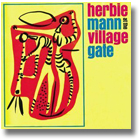Music |
Herbie Mann
By
Published: Aug 13, 2023
Category:
Jazz
SUPPORTING BUTLER: You can become a patron of this site, and automatically donate any amount you please — starting with $1 — each month. The service that enables this is Patreon, and to go there, just click here. Again, thank you.
LAST WEEK IN BUTLER: Weekend Butler. Robin Williams. Andy Palacio and the Garifuna Collective. Brita Water Filter.
—
Herbie Mann was born Herbert Jay Solomon in 1930. He got his first saxophone when he was 9. By l4, he was in a band that played resorts in the Catskills. In the Army, he carried an instrument instead of a gun.
In l953, a stroke of luck: A friend told him a jazz band needed a flute player. Mann had never played a flute; at the audition, he played sax. His flute, he said, was being repaired. Only when he got the job did he take a crash course in jazz flute.
By the late ’50s, Mann had his own band and was getting somewhere. Again, good fortune: A friend suggested that he add a conga player. His music changed; he was, suddenly, among the first to draw on international sounds and play what is now known as World Music. And then, in 1962, his band rocked the downtown clubs.
The first song on “At the Village Gate” is “Comin’ Home Baby.” How often does an almost nine-minute jazz tune reach the top 30 singles? But it was an instant hit on the pop charts. And then the album was a hit, and then it was elevated to the ranks of classic.
Six decades later, here’s how cool “Village Gate” is: It could have been made yesterday. That is, if there were a group around that dared to launch “Comin’ Home Baby” with a solid minute of stand-up bass playing a single note against subtle bop drums — a combination that practically forces listeners to get up and strut. [To buy the CD — USED— or the MP3 download of “At the Village Gate” from Amazon, click here.]
Restrain yourself, for here comes Herbie Mann’s “Comin’ Home Baby”.
The flute is not, they say, a jazz instrument. Well, it is here. There’s the lilt and trill of songbirds. But even more, there’s a killer melody, and Mann drives it hard, turning your walk into an outrageous thrust of hips.
“Comin Home Baby” is sexy and smart. “Summertime” — click here — and “It Ain’t Necessarily So” — click here — show how you can take Gershwin into a delightful, Brazilian-tinged zone.
Three songs, one of them indelible, two merely great.
Half a million copies sold in the first year or so.
With this three-song album, Mann changed the look and sound of jazz. A flute as the lead instrument — extra points to anyone who can recall the last time that happened. A solid bass section. And rhythms that had as much to do with Brazil as Birdland. New. All new.
The result: Music that gets under your skin. Music you take with you as you go about your day. Music you play at dinner, at parties, at late-night rendezvous. And the best part: This music ain’t cerebral. It finds a groove and rides it, toying with it just enough to keep you leaning in.
Someone wrote on Amazon: There are only three “cool” jazz records from the late ’50s and early ’60s that you absolutely must have: Kind of Blue by Miles Davis, Time Out by Dave Brubeck, and Herbie Mann “At the Village Gate.” Just so.
Listen to a bit of “Comin’ Home Baby.” Dollars to donuts, your feet will move, your mood will lift, and, no matter what your kids think about you, you’ll know you’re “cool.”


